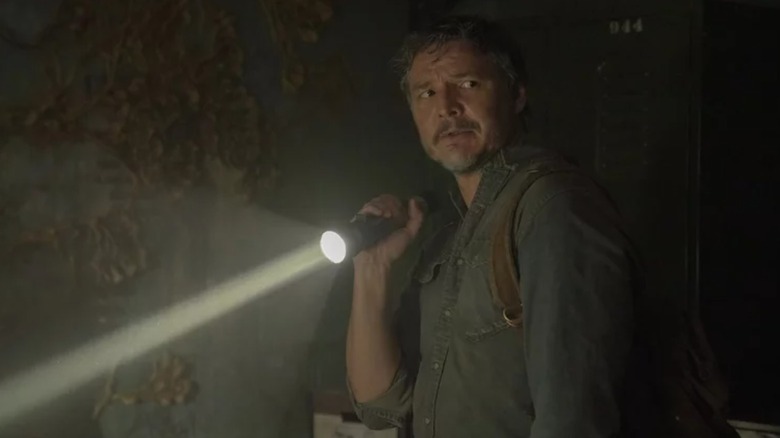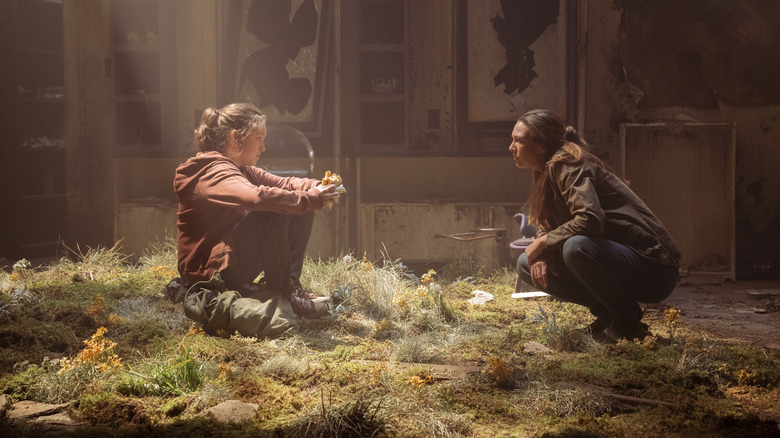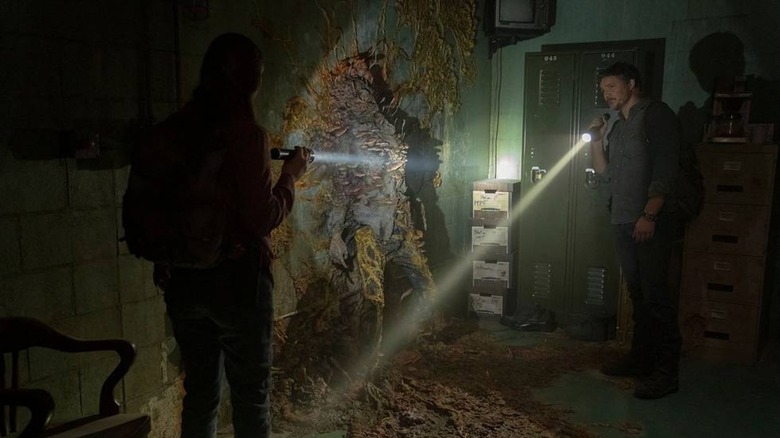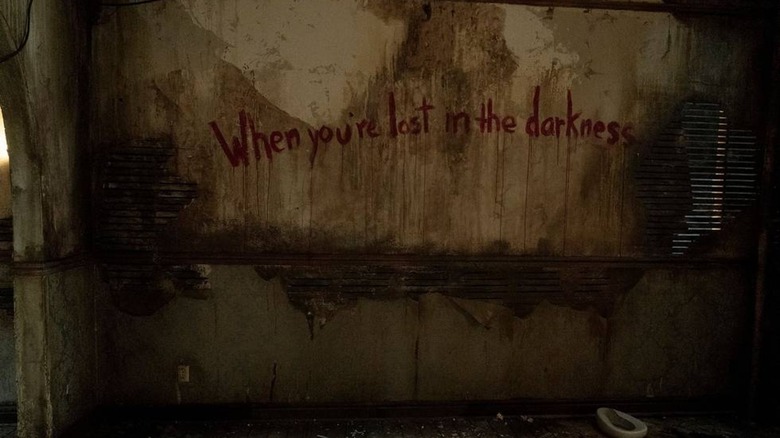The Opening Scene Of HBO's The Last Of Us Is A Double-Edged Sword
This post contains spoilers for the first episode of HBO's "The Last of Us."
For people who have played "The Last Of Us," it's hard to finish the game and move on. In fact, most of us don't. Instead, we become evangelists for the game (or games, if you're into the more polarizing second installment), talking its masterfully told story up to everyone we know in hopes that they, too, might get to experience the heartbreak, horror, and hope of Joel and Ellie's story.
For me, as a TV-lover first and a gamer second (if at all), this sort of wild-eyed evangelism extended to crossing all my fingers and toes in hopes that the game's eventual adaptation would be striking enough to catch the attention of the folks who would never come to the story in game form. This sense of protectiveness over the source material makes me feel silly, but I know I'm far from alone in this. In fact, interviews with Neil Druckmann indicate that the game creator himself has held off on an adaptation for this long because he wants so badly to get it right.
Well, "The Last of Us" is finally here, and Druckmann and Craig Mazin's adaptation of the Naughty Dog game is starting fairly strong with a captivating, feature-length pilot. The series' first episode sets the stage for the post-apocalyptic world that's been ravaged by a fast-growing mutation of the Cordyceps fungus, which attaches to human hosts and turns them feral and zombie-like before consuming their bodies from the inside out. It also tells the story of Joel (Pedro Pascal) and Sarah (Nico Parker), a tragedy that hits even harder on screen thanks to Pascal's emotionally raw live-action performance.
Flashback to 1968
There's a lot to love in the first episode of "The Last of Us," and a whole lot more to come, but there's also at least one element of the premiere that's will surely be polarizing: its opening scene. The three-minute cold open is a slab of surprisingly shapeless exposition that familiarizes viewers with the show's mythology, yet doesn't include any of the characters we know and love. The introductory scene instead features a scientist played by John Hannah appearing on a talk show opposite Josh Brener's host in a brief detour to the year 1968. In it, Hannah's character discusses his certainty that if a global extinction event comes around, it won't be at the hands of a virus, but a fungus.
In contrast, the game version of "The Last Of Us" starts with Sarah's story, before a tightly edited mashup of newscast fragments can be heard over the opening credits, doing their own expositional heavy-lifting before the game jumps suddenly to a period 20 years into the future. There's no scientist, no TV host, and no smokey beige TV studio. In the scheme of things, it's not a huge change, but after having screened the entire first season — and adored many of the ways it expands upon the source material — this throwaway scene may be my least favorite alteration from game to screen.
Pros and cons of the fungus explainer
To be fair, the fungus explainer scene serves a distinct purpose. In a post-COVID world, anyone engaging with a story about a pandemic is sure to recall their own experiences these past three years, and either connect with or tune out similar stories accordingly. Some viewers may also be more scientifically savvy now than they were when the game debuted in 2013, having frequently read up on the nature of viruses since 2020. So the three-minute explainer serves as an intriguing setup that distinguishes "The Last of Us" from both typical zombie stories and now-familiar pandemic tales. It could hook intrigued viewers, even those who may have stumbled upon the show without any context for the game on which it's based.
It's also a moment that holds deeper meaning for those who have played the game. The scientist's insistence that a fungal infection wouldn't have a cure is integral to the bulk of the overarching storyline. It sets the stakes for the story, although it's perhaps purposely misleading about them, introducing what turns out to be a very intimate, personal story with an impersonal scientific discussion on the global stage.
Overall, if there's one thing the premiere of "The Last of Us" is lacking that the video game had in abundance, it's a sense of consistent, urgent tension. In place of the anxiously-paced transition from Sarah's story to the game's modern day, we get a slow fade that juxtaposes her death to that of a random child who ends up killed two decades later. We also don't experience the heart-pounding build of Sarah's last day with the same sense of confusion and mystery that game-players experience, since we know the nature of the apocalypse in exact terms before it begins.
Successful hook or not, the show is off to a good start
As a "The Last of Us" evangelist, I also worry that the pandemic talk could backfire, turning off viewers who don't want to engage in yet another story about global sickness. It gives the false impression that the show might be about the immediate aftermath of the Cordyceps infection, or have something to do with any of the characters on screen. On a simpler level, it's just not as compelling or visually stirring as anything the game has to offer. Of course, anyone who would turn off a show in its first few minutes isn't exactly the target audience for this character-driven drama anyway. Still, I, like many people, am decidedly un-chill about this game, so it's hard not to fret about any detail that could prevent new-to-the-franchise viewers from engaging with this story.
The good news is this: after its functionally helpful yet overly-explanatory start, "The Last of Us" kicks into high gear with a premiere that nails one of the game's most emotional moments and introduces the characters we know and love with care. Pascal is instantly exceptional as Joel, and Bella Ramsey captures Ellie's stubbornness, playfulness, and kiddish naivety well in the character's first few scenes. Whether the show's initial jump decades into the past is ultimately helpful or pointless, the show moves on from it quickly, delivering an action-packed opener that's sure to be intriguing to both newbies and game-players alike.
"The Last of Us" airs new episodes Sundays on HBO.



